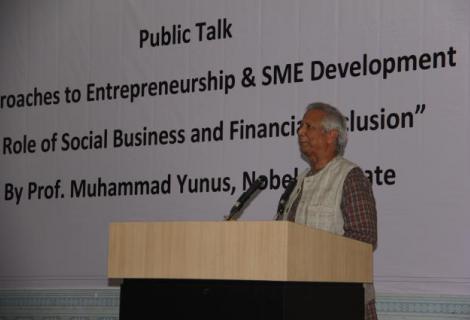
Seeing Poverty in a Worm’s Eye View: A Public Talk by Professor Muhammad Yunus
Article and Photograph by Thant Zin
"When you look from a bird-eye view, you see too many things, but not too detailed. I looked from the worm-eye view, just as a worm crawling on the ground. Being a professor, if I try to see things from bird-eye view, I would have written a paper about it, but I see poverty in a worm-eye view, those people suffering are my neighbours. So instead of writing a paper, I thought how to be helpful to them. ” This is an inspiring phrase from a Nobel Laureate Professor Muhammad Yunus.
It was at the public talk by Professor Yunus which was jointly organized by ActionAid Myanmar, National Economic and Social Advisory Council Myanmar (NESAC) and Union of Myanmar Federation of Chambers of Commerce and Industry (UMFCCI), that I had a chance to hear his story from himself.
Being a humble man, he made it sound like a very easy thing. According to his words, what he did, despite the tremendous eventual impact, begins from a simple desire; he wanted to help people from their troubles. While he was a professor at University of Chittagong, he noticed people’s suffering because of poverty in the neighbourhood itself.
It was then he realized the most serious challenge for the poor to liberate themselves is the lack of financing opportunities. Because of this, the poor had to go to the loansharks to get a loan, and then their misfortunes grow even more. “Loansharks are widespread in this culture and in many other cultures, Shakespeare wrote about it and many other did the same. But hardly any solution has been presented. The system itself allows such cruelty, but instead of writing anything about change in the system, I only thought that if I lend that money to the poor, they won’t have to worry about loansharks.”
“So I started lending money. People welcome it; I am a lender but a generous one. And process grows. This becomes microcredit.”
Then Grameen bank was established, and from the Grameen bank, he described his continuation to other industries such as telecommunications (Grameen Phone), solar energy (Grameen Shakti) and food and beverages (Grameen Danone), all are successful social-businesses with primary goal of helping people in their struggle from poverty.
This success story was the one Professor Yunus wrote originally in Bangladesh. But his concepts of microcredit, microfinance and social-business are not limited to Bangladesh alone. These ideas have been exported throughout the world, and during the talk, Professor Yunus discussed how Myanmar could get benefits from these concepts.
He discussed about the conditions such as proper regulations and interest rate range that would allow microfinance to thrive. And he was confident that changes in technology, particularly in telecommunication technology, will have a huge impact in poverty reduction in Myanmar. Moreover, when a senior member of UMFCCI raised the opportunity of technical transfer from Yunus Centre and better collaboration with Myanmar, he discussed about the opportunity more than technical transfer of Yunus Centre alone, he invited to the Social Business Day where Myanmar delegates could meet and discuss with those from other nations. Also the MoU between University of Yangoon and Yunus Centre has been signed.
However, not everything sounded bright for Myanmar in the talk, a huge warning clings on my mind when the talk finished. A local businessman asked his suggestion for Myanmar entrepreneurs who have no access to finance like their Bangladeshi counterparts. Being a frank man Professor Yunus replied:
“If finance is not available, then finance availability must be done first because if you cannot get any finance, even if you have a sea in front of you, you can’t make use of that sea without finance, till the sea goes dry.”